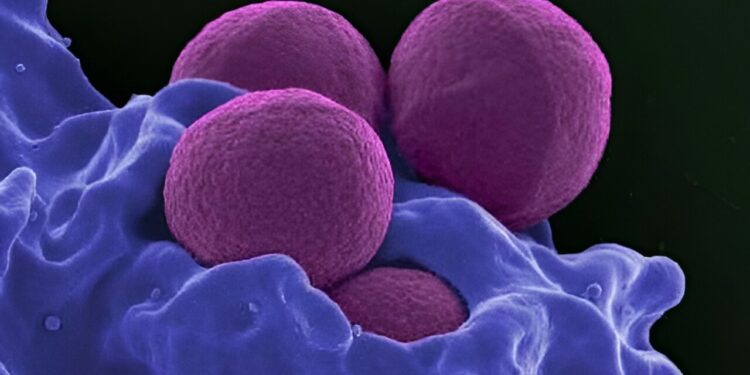Colorized scanning electron micrograph of MRSA. Credit: National Institute of Allergy and Infectious Diseases
Staphylococcus aureus, commonly known as antibiotic-resistant Staphylococcus aureus (MRSA), is a leading cause of community-acquired and hospital-acquired infections. According to the latest data, MRSA killed approximately 120,000 people worldwide in 2022, and many more are killed by antibiotic-sensitive strains of S. aureus.
So far, all attempts to develop a protective vaccine against Staphylococcus aureus have failed. Researchers from UMC Amsterdam, in collaboration with UMC Utrecht, Leiden University and the University of California San Diego, have discovered an important immune component that provides protection against infection, suggesting a new direction for the future. These results are published in Reports on medicine cells.
“Our results directly challenge the current way of thinking about staph infections. It is generally assumed that recognition of S. aureus by IgG antibodies, which help immune cells kill Staph, is essential to provide protection. In this study, we suggest that this may not be the answer. We show that it is not IgG antibodies, but IgM antibodies that are needed to eliminate S. aureus during an infection,” says Nina van Sorge, Professor of Translational Microbiology at Amsterdam UMC.
The research team, led by Professor van Sorge and Dr Astrid Hendriks, a postdoctoral fellow in his group, investigated the presence of antibodies that recognise S. aureus in the blood of healthy individuals. They focused on particular sugars, which form a kind of sugar layer around the bacteria. They found that almost all healthy individuals had both IgG and IgM antibodies that could recognise these sugar layers.
“We all have high levels of antibodies against the sugar membrane of S. aureus because we are exposed to this bacteria many times during our lives without getting sick. Yet we don’t know which antibodies actually prevent us from getting sick,” Hendriks says.
In the laboratory, IgM antibodies have been shown to be significantly more effective at killing bacteria than IgG.
“IgG antibodies provide protection against bacterial pathogens in general and are in fact essential for the protective effect of vaccines against, for example, pneumococcal and meningococcal infections. But for S. aureus, it is more complex. This clever bacterium has developed ways to circumvent our defense system, and in particular IgG antibodies, which is partly why it still causes so much trouble,” says van Sorge.
However, the researchers found that S. aureus did not counteract the effects of IgM.
Ultimately, they found that patients with life-threatening Staphylococcus aureus bloodstream infections actually had much lower levels of sugar-specific IgM antibodies in their blood than healthy individuals. Importantly, patients who did not survive the infection had the lowest amount of IgM antibodies.
Researchers hypothesize that insufficient levels of sugar-specific IgM antibodies increase the risk of serious staph infections and even death.
Although further research is needed to validate this hypothesis, these findings provide important new insights that could shape the future development of vaccines and other immune-boosting therapies.
More information:
Glycan-specific IgM is essential for human immunity against Staphyloccus aureus, Reports on medicine cells (2024). On bioRxiv: www.biorxiv.org/content/10.110 … /2023.07.14.548956v2
Provided by the University Medical Centers Amsterdam
Quote:A critical immune factor for host defense against MRSA offers a potential explanation for unsuccessful vaccine strategies (2024, September 17) retrieved September 17, 2024 from
This document is subject to copyright. Apart from any fair dealing for the purpose of private study or research, no part may be reproduced without written permission. The content is provided for informational purposes only.



